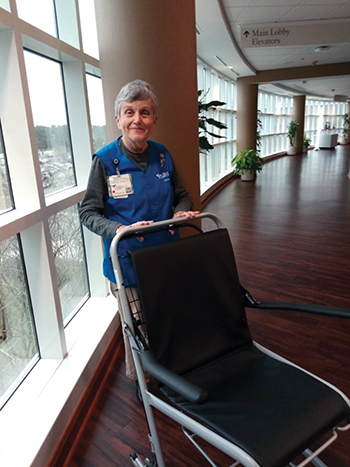Bladder Cancer Survivor
A Neobladder is the Way to Go For This Survivor

After five bladder cancer recurrences, Ann Garner made the life-altering decision to have her bladder removed. Today, with a disposable catheter always tucked discreetly in her purse, she is an active hospital volunteer and a frequent flier who dotes on her grandkids.
I’d never heard of bladder cancer until my diagnosis in 2005. My grandpa died of colon cancer, my father and brother lived through prostate cancer and two aunts survived breast cancer. But cancer in the bladder was a new one for me and my husband, Clarence. As it turned out, this was just the beginning of how bladder cancer would change both our lives in the years to come.
In 47 years of marriage, I saw my husband cry only once. Just a week after we learned I had cancer, he had a stroke. He broke down in his hospital room. “Here I am in this (darned) hospital bed with this (darned) stroke,” he said, “when I should be taking care of you.” I squeezed his hand and told him to think of our wedding vows; we’d promised for better, for worse, in sickness and in health. “We’ll take care of each other,” I told him. “We’ll get through this together.” And that’s exactly what we did for the next five years.
The cancer was diagnosed at Stage I. Both tumors were small and hadn’t grown into the bladder wall. My urologist explained the standard of care for early-stage bladder cancer was bacillus Calmette-Guérin (BCG). It’s injected straight into the bladder. Because it doesn’t go through your whole system like many other treatments, my side effects were minimal. Heavy fatigue the next day was about it. I hadn’t retired yet from 32 years as a secretary at our county high school, so I’d schedule late Thursday afternoon treatments, take Friday off to rest and be back to work Monday.
Noninvasive bladder cancer has a high recurrence rate, about 50 percent within the first five years. Mine came back within six months. Over the next four years, I had five recurrences and one borderline, always with multiple small tumors. We stayed with BCG treatments, adding another immunotherapy after two years. I believe those treatments and my follow-ups – every three months – kept the tumors from progressing past Stage I. But we lived with the fear that the next tumors could be later-stage.
My urologist felt strongly that my bladder should be removed before tumors became invasive and broke through the bladder wall. He referred me for a second opinion at a large teaching and research hospital. The bladder cancer specialist agreed with my urologist: my bladder had to come out.
He performed a radical cystectomy with lymph node dissection, removing my entire bladder. A partner in his practice then began reconstructive surgery to create a “neobladder” replacement using a small segment he removed from my small intestine. He stretched and shaped the piece of intestine to form a pouch, connecting the top to the ureters running from the kidneys and the bottom to the urethra, just like a real bladder. If all went well with the neobladder, I’d be able to urinate the normal way after an adjustment period.
It was a huge decision, but my urologist really put us at ease. He clearly described the risks and benefits, answering all our questions. He explained that it’s a complex surgery with no guarantees. Also, a neobladder can stop working. After a lot of discussion and prayers, we said, “Let’s go for it,” and I’ve never had a single regret.
A year later, life was pretty much back to normal when the unthinkable happened. Clarence, my rock for nearly half a century, was also diagnosed with bladder cancer. His was Stage IV, and he was gone in less than six months. Until something like that happens, you don’t realize how much “family” you really have. Besides two wonderful daughters, their husbands and my three adorable grandkids, I was supported by a loving church family and school family. I also had a close friend to confide in and my faith to comfort me.
The neobladder worked for four-and-a-half years. Since then, I’ve needed to “self-catheterize” three times a day. I insert a small disposable catheter into my urethra to drain the urine in my neobladder into the toilet.
Today, I volunteer two days a week transporting patients at a nearby hospital. Recently, a patient mentioned that she prays her cancer goes into remission. So I told her I am a cancer survivor myself. She said, “You had cancer, and you’re pushing my wheelchair down these long halls?” I laughed and said I get in my steps without paying a club membership.
Many people think their life is over when they hear the word “cancer.” I am living proof that it isn’t.


